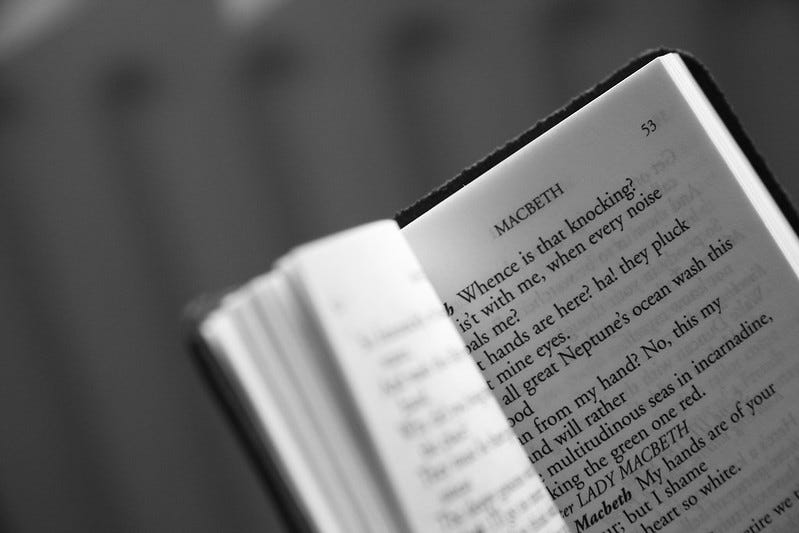Macbeth is innocent!
Was it the witches? Was it Lady M? Or was Macbeth really just a murderous usurper? True-crime playwright William Shakespeare sows doubts in the court of public opinion…
In This Is Shakespeare: How to Read the World’s Greatest Playwright, Professor Emma Smith writes a fascinating essay about Macbeth.
She talks about the play’s ‘vivid aftermath’ in a ‘genre of amateur investigations and celebrity show trials that are specifically concerned with agency’.
Humorists, actors, writers, lawyers have all had fun putting Macbeth and Lady Macbeth under the spotlight to determine their guilt or innocence as murderers.
Prof Smith cites a 2012 celebrity charity event in which the thane and his ladyship were put on mock trial in London’s Royal Courts of Justice.
Matthew Macfadyen and Maxine Peake
Played by Matthew Macfadyen, who went on to international stardom in Succession, and Shameless’s Maxine Peake, Macbeth and Lady Macbeth testified in front of 500 onlooking barristers.
This learned audience had to decide the verdict. The result: the accused were found not guilty of murdering King Duncan and Banquo.
What would the Bard have said to that. He makes it perfectly clear in his drama that the scheming couple done the deed.
But as Prof Smith explains in her book, Shakespeare also begs many questions on how such a crime comes about.
She writes, ‘The play contrives… to anatomise, and thereby to equivocate, these apparently straightforward questions of responsibility and causation.’
Something wicked this way comes
The first question posed is to what extent supernatural forces in the shape of the three witches are to blame for the regicide. The witches confront Macbeth and Banquo on the blasted heath and encourage ambition in Macbeth’s mind by predicting his future greatness – that he will advance from being Thane of Glamis to Thane of Cawdor and finally to the throne itself.
Macbeth dismisses this at first because the Thane of Cawdor is alive and fighting for the king, the same as he and Banquo are. But the witches – and the audience – already know that Cawdor is traitor and has been executed.
Are the Weird Sisters tricksters, duping Macbeth like con artists betting on a game they have rigged? Or do they have supernatural power to direct him? They certainly have a flair for murky ambivalence – ‘Fair is foul, and foul is fair…’
In the two most famous movie versions of the play, by Orson Welles and Roman Polanski, emphasis is placed on the power of the witches, who return at the end of. the films to round off their involvement.
The Macbeths’ joint enterprise
In the play they don’t return, suggesting their intervention is limited to provocation rather than control.
Prof Smith pushes aside the misogynistic portrayal of Lady M as the homicidal power behind a weak man. Instead, she emphasises the Macbeths’ joint enterprise in regicide as a folie à deux.
In the charity event, Macfadyen’s Macbeth pleaded diminished responsibility, while Peake claimed her character had been coerced into the plot.
Macbeth as a victim of Post-Traumatic Street Syndrome, perhaps? Lady Macbeth as victim of a violent husband?
In This Is Shakespeare, Prof Smith sums it up: ‘Macbeth asks why things happen: that we still can’t answer is key to its unsettling hold on our imagination.’
Fiction and non-fiction writers – Edgar Allan Poe, Charles Dickens, Agatha Christie, Truman Capote, Gordon Burn, most recently Jessica Knoll, and many others – have never stopped using real crimes to explore why things happen.
I wrote about Channel 4’s The Real Serpent last week. Having now watched all three episodes, I can’t say I was surprised Charles Sobhraj didn’t break down and confess to being a mass killer.
I thought the producers Monster Films, former detectives Jackie Malton and Gary Copson, and forensic psychologist Paul Britton did a good job of boxing in the convicted killer, exposing his lies and evasions.
Sobhraj clearly loved the limelight and notoriety. In the end, the documentary’s value, for me, was watching him up close. Despite all the talk of his charm and charisma, he was not persuasive and could not shake off his air of arrogance and dishonesty.
Will he face justice for other murders of which he suspected, as the programme hoped? I doubt it. The authorities rarely have an appetite for re-opening 50-year-old cases.





